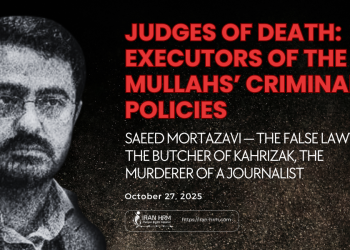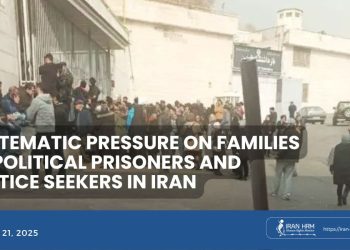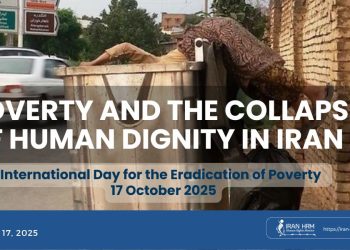Introduction – Widespread Wave of Executions of Political Opponents
The ruling regime in Iran, fearing the resurgence of a nationwide uprising, is step by step preparing for another massacre of political prisoners. Signs that were evident before the bloody summer of 1988 have reappeared today: heightened security in prisons, classification and transfer of political prisoners to unknown locations, and widespread suppression of calls for justice in society.
In this context, Fars News Agency, affiliated with the Islamic Revolutionary Guard Corps (IRGC), recently published an unprecedented article titled “Why Should We Repeat the Experience of the 1988 Executions?!” implicitly urging the judiciary to adopt the same policy toward today’s political opponents. This stance, interpreted by international bodies as an explicit endorsement of executing political dissidents, has intensified concerns over large-scale human rights violations in Iran.
Targeted Arrests and the Start of a New Execution Wave
Reports from human rights sources and eyewitnesses indicate that since early summer 2025, alongside heightened security measures, the pace of carrying out death sentences against political opponents has increased. These executions are often carried out in secrecy, without informing families, and the bodies of victims: similar to the 1980s are buried clandestinely.
In July 2025, political prisoners Mehdi Hassani and Behrouz Ehsani, who had been in captivity for years, were executed in total news blackout. Their families, after days of uncertainty, were only informed via a brief phone call from authorities, and were denied the bodies or knowledge of the burial sites.
At the same time, the forced transfer of political prisoners has intensified. Veteran political prisoner Saeed Massouri was first moved to Zahedan Prison and later to solitary confinement in Qezel Hesar Prison in Karaj.
In another incident, during the transfer of a group of prisoners from Fashafouyeh Prison to Evin Prison, riot control forces attacked and beat inmates, separating five political prisoners sentenced to death Vahid Bani-Amrian, Pouya Ghobadi, Shahrokh Daneshvarkar, Mohammad Taghavi, and Babak Alipour: from the others. Without prior notice to families or the chance for contact, these prisoners were taken to an unknown location, later confirmed as Qezel Hesar Prison in Karaj.
Reports from Evin, Gohardasht, Sanandaj, and Ahvaz prisons also indicate that systematic classification of political prisoners has begun, with some being separated from their cellmates and moved to specific wards or other prisons a method previously used before the 1988 massacre as a prelude to mass executions.
International Condemnation and Urgent Warnings
The surge in mass executions, forced transfers, and classification of political prisoners has triggered alarm among global human rights organizations. Many have warned that these developments bear disturbing similarities to the lead-up to the 1988 massacre, and that the risk of another genocide against political opponents in Iran cannot be ignored.
In the latest reactions, Professor Javaid Rehman, former UN Special Rapporteur on the situation of human rights in Iran, speaking at the 3rd “Free Iran World Summit” in Rome, Italy, on 31 July 2025, warned:
“The world failed in 1988; today it must not fail again. The increase in executions, torture, arbitrary arrests, and forced transfers are all signs of the potential occurrence of another massacre. The state-run ‘Fars News Agency’ has even called this approach a ‘successful experience.’ These policies constitute the realities of crimes against humanity and potentially genocide. An international mechanism for investigation and accountability must be established.”
Simultaneously, on 8 August 2025, Amnesty International issued an urgent and rare statement warning:
“The sudden transfer of these five political prisoners to Qezel Hesar Prison could be a prelude to carrying out their death sentences in the coming days. Iranian authorities must immediately halt all plans for their execution. They were sentenced to death following a grossly unfair trial, with allegations of torture, denial of access to lawyers during detention, and deprivation of adequate legal safeguards. Urgent global action is needed to save their lives.”
Conclusion and Call for International Action
The available evidence, along with explicit threats from state media, is a serious alarm bell; once again demonstrating that without effective, coordinated pressure from the international community, the risk of a repeat of the mass execution of political prisoners is entirely real.
In 1988, the silence and inaction of the international community allowed the regime in Iran to annihilate thousands of political prisoners in just a few weeks. Today, the same pattern is unfolding.
We call on the UN Human Rights Council, the Office of the High Commissioner for Human Rights, and all governments committed to the principles of international law to:
– Establish an independent international mechanism to urgently investigate the current wave of executions and possible preparations for a massacre.
– Apply diplomatic pressure and targeted sanctions against judicial, security, and political officials responsible for these crimes.
– Use all available means to immediately prevent the execution of these political prisoners.
– Initiate proceedings for the issuance of international arrest warrants against the perpetrators and masterminds of these crimes.
The time to act is now. Every day of delay could cost the lives of hundreds if not thousands of political prisoners.







